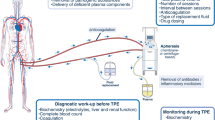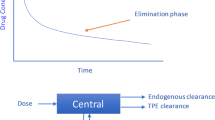Abstract
Purpose
Pregnancies in women with essential thrombocythemia (ET) are at a higher risk for obstetrical complications. Acetylsalicylic acid (ASA) and low-molecular weight heparin (LMWH) are common options to prevent miscarriages and maternal complications, whereas interferon alpha (IFN) seems to be the cytoreductive therapy of choice. This retrospective study analyzes the largest number of IFN pregnancies to date in terms of outcome and safety.
Methods
Data of 34 high-risk pregnancies in 23 women presenting at the University hospitals of Minden and Jena from 01-Jun-2007 to 01-Jun-2020 were collected. Reasons defining high-risk ET pregnancy in all 23 patients were: Thrombosis (n = 9) or severe hemorrhage (n = 2) in history, platelet count ≥ 1500 × 103/µl (n = 8) or severe microcirculatory disturbances not completely responding to ASA (n = 4).
Results
Without the use of IFN, live birth rate was 60% (6/10), however, after the use of IFN live birth rate increased to 73.5% (25/34 pregnancies). Nine pregnancies ended in miscarriages (9/34; 26.5%); all of them spontaneous abortions. Live birth rate significantly improved with ASA (90% versus 50%, p = 0.0168), however, if ASA and LMWH was added (n = 14), live birth rate was 100%. IFN compound (PEGylated versus standard IFN) and JAK2-driver mutation had no impact on pregnancy outcome. One major maternal complication occurred as a major peripartal bleeding after abortion curettage.
Conclusion
IFN was associated with an encouraging live birth rate of 73.5% with no fatal maternal events and manageable side effects.
Similar content being viewed by others
Code availability
Not applicable.
References
Andersen A-MN (2000) Maternal age and fetal loss: population based register linkage study. BMJ 320:1708–1712. https://doi.org/10.1136/bmj.320.7251.1708
Barbui T, Barosi G, Birgegard G et al (2011) Philadelphia-negative classical myeloproliferative neoplasms: critical concepts and management recommendations from European leukemiaNet. J Clin Oncol 29:761–770. https://doi.org/10.1200/JCO.2010.31.8436
Barbui T, Finazzi G, Carobbio A et al (2012) Development and validation of an international prognostic score of thrombosis in world health organization–essential thrombocythemia (IPSET-thrombosis). Blood 120:5128–5133. https://doi.org/10.1182/blood-2012-07-444067
Barbui T, Tefferi A, Vannucchi AM et al (2018) Philadelphia chromosome-negative classical myeloproliferative neoplasms: revised management recommendations from European LeukemiaNet. Leukemia 32:1057–1069. https://doi.org/10.1038/s41375-018-0077-1
Beauverd Y, Radia D, Cargo C et al (2016) Pegylated interferon alpha-2a for essential thrombocythemia during pregnancy: outcome and safety. Case Series Haematol 101:e182–e184. https://doi.org/10.3324/haematol.2015.139691
Cincotta R, Higgins JR, Tippett C et al (2000) Management of essential thrombocythaemia during pregnancy. Aust N Z J Obstet Gynaecol 40:33–37. https://doi.org/10.1111/j.1479-828X.2000.tb03163.x
Gangat N, Wolanskyj AP, Schwager S, Tefferi A (2009) Predictors of pregnancy outcome in essential thrombocythemia: a single institution study of 63 pregnancies. Eur J Haematol 82:350–353. https://doi.org/10.1111/j.1600-0609.2009.01214.x
Griesshammer M, Sadjadian P, Wille K (2018) Contemporary management of patients with BCR-ABL1 -negative myeloproliferative neoplasms during pregnancy. Expert Rev Hematol 11:697–706. https://doi.org/10.1080/17474086.2018.1506325
Griesshammer M, Struve S, Barbui T (2008) Management of Philadelphia negative chronic myeloproliferative disorders in pregnancy. Blood Rev 22:235–245. https://doi.org/10.1016/j.blre.2008.03.007
Harrison C (2005) Pregnancy and its management in the Philadelphia negative myeloproliferative diseases. Br J Haematol 129:293–306. https://doi.org/10.1111/j.1365-2141.2005.05400.x
How J, Hobbs G (2020) Use of interferon alfa in the treatment of myeloproliferative neoplasms: perspectives and review of the literature. Cancers 12:1954. https://doi.org/10.3390/cancers12071954
Martinelli P, Martinelli V, Agangi A et al (2004) Interferon alfa treatment for pregnant women affected by essential thrombocythemia: case reports and a review. Am J Obstet Gynecol 191:2016–2020. https://doi.org/10.1016/j.ajog.2004.05.001
Maze D, Kazi S, Gupta V et al (2019) Association of treatments for myeloproliferative neoplasms during pregnancy with birth rates and maternal outcomes: a systematic review and meta-analysis. JAMA Netw Open 2:e1912666. https://doi.org/10.1001/jamanetworkopen.2019.12666
Melillo L, Tieghi A, Candoni A et al (2009) Outcome of 122 pregnancies in essential thrombocythemia patients: a report from the Italian registry. Am J Hematol 84:636–640. https://doi.org/10.1002/ajh.21504
Niittyvuopio R, Juvonen E, Kaaja R et al (2004) Pregnancy in essential thrombocythaemia: experience with 40 pregnancies. Eur J Haematol 73:431–436. https://doi.org/10.1111/j.1600-0609.2004.00324.x
Passamonti F, Randi ML, Rumi E et al (2007) Increased risk of pregnancy complications in patients with essential thrombocythemia carrying the JAK2. Mutation 110:6
Randi ML, Bertozzi I, Rumi E et al (2014) Pregnancy complications predict thrombotic events in young women with essential thrombocythemia: pregnancies in patients with essential thrombocythemia. Am J Hematol 89:306–309. https://doi.org/10.1002/ajh.23635
Robinson SE, Harrison CN (2020) How we manage Philadelphia-negative myeloproliferative neoplasms in pregnancy. Br J Haematol 189:625–634. https://doi.org/10.1111/bjh.16453
Rumi E, Bertozzi I, Casetti IC et al (2015) Impact of mutational status on pregnancy outcome in patients with essential thrombocytemia. Haematologica 100:e443–e445. https://doi.org/10.3324/haematol.2015.131458
Schulman S, Angerås U, Bergqvist D et al (2010) Definition of major bleeding in clinical investigations of antihemostatic medicinal products in surgical patients. J Thromb Haemost 8:202–204. https://doi.org/10.1111/j.1538-7836.2009.03678.x
Skeith L, Carrier M, Robinson SE et al (2017) Risk of venous thromboembolism in pregnant women with essential thrombocythemia: a systematic review and meta-analysis. Blood 129:934–939. https://doi.org/10.1182/blood-2016-09-728006
Sleijfer S, Bannink M, Van Gool AR, Kruit WH, Stoter G (2005) Side effects of interferon-α therapy. Pharma World Sci 27(6):423
Sultan AA, West J, Tata LJ et al (2012) Risk of first venous thromboembolism in and around pregnancy: a population-based cohort study: risk of VTE in and around pregnancy. Br J Haematol 156:366–373. https://doi.org/10.1111/j.1365-2141.2011.08956.x
Tefferi A, Guglielmelli P, Larson DR et al (2014) Long-term survival and blast transformation in molecularly annotated essential thrombocythemia, polycythemia vera, and myelofibrosis. Blood 124:2507–2513. https://doi.org/10.1182/blood-2014-05-579136
Vardiman JW, Thiele J, Arber DA et al (2009) The 2008 revision of the World Health Organization (WHO) classification of myeloid neoplasms and acute leukemia: rationale and important changes. Blood 114:937–951. https://doi.org/10.1182/blood-2009-03-209262
Funding
No funding was committed for this study.
Author information
Authors and Affiliations
Consortia
Contributions
LS, KW, and MG developed the study protocol and questionnaire. LS, KW, MG, FHH, PS and AH collected and analyzed data. TB and VK collected data. LS, KW, MG, AH and FHH wrote the manuscript.
Corresponding author
Ethics declarations
Conflicts of interest
F.H.H, A.H. and M.G. revealed their conflict of interests. The other authors declare that they do have no conflict of interests.
Ethics approval
The questionnaire and study protocol for this retrospective study were approved by the Ethics Committee of the Ruhr-Universität Bochum, based in Bad Oeynhausen (Protocol file number #2017–285).
Consent to participate
Informed consent was obtained from all individual participants included in the study.
Consent for publication
Patients gave informed consent regarding publication of their data.
Availability of data and material
Datasets generated during and/or analysed during the current study are available from the corresponding author on reasonable request.
Additional information
Publisher's Note
Springer Nature remains neutral with regard to jurisdictional claims in published maps and institutional affiliations.
Rights and permissions
About this article
Cite this article
Schrickel, L., Heidel, F.H., Sadjadian, P. et al. Interferon alpha for essential thrombocythemia during 34 high-risk pregnancies: outcome and safety. J Cancer Res Clin Oncol 147, 1481–1491 (2021). https://doi.org/10.1007/s00432-020-03430-4
Received:
Accepted:
Published:
Issue Date:
DOI: https://doi.org/10.1007/s00432-020-03430-4




